Top Tips for Valuing Coins: A Comprehensive Guide to Finding Coin Worth
Curious about the value of your coins? This guide on valuing coins covers everything from understanding different types of value, such as market and intrinsic, to identifying key factors that influence coins worth, like rarity and condition. Learn how to...
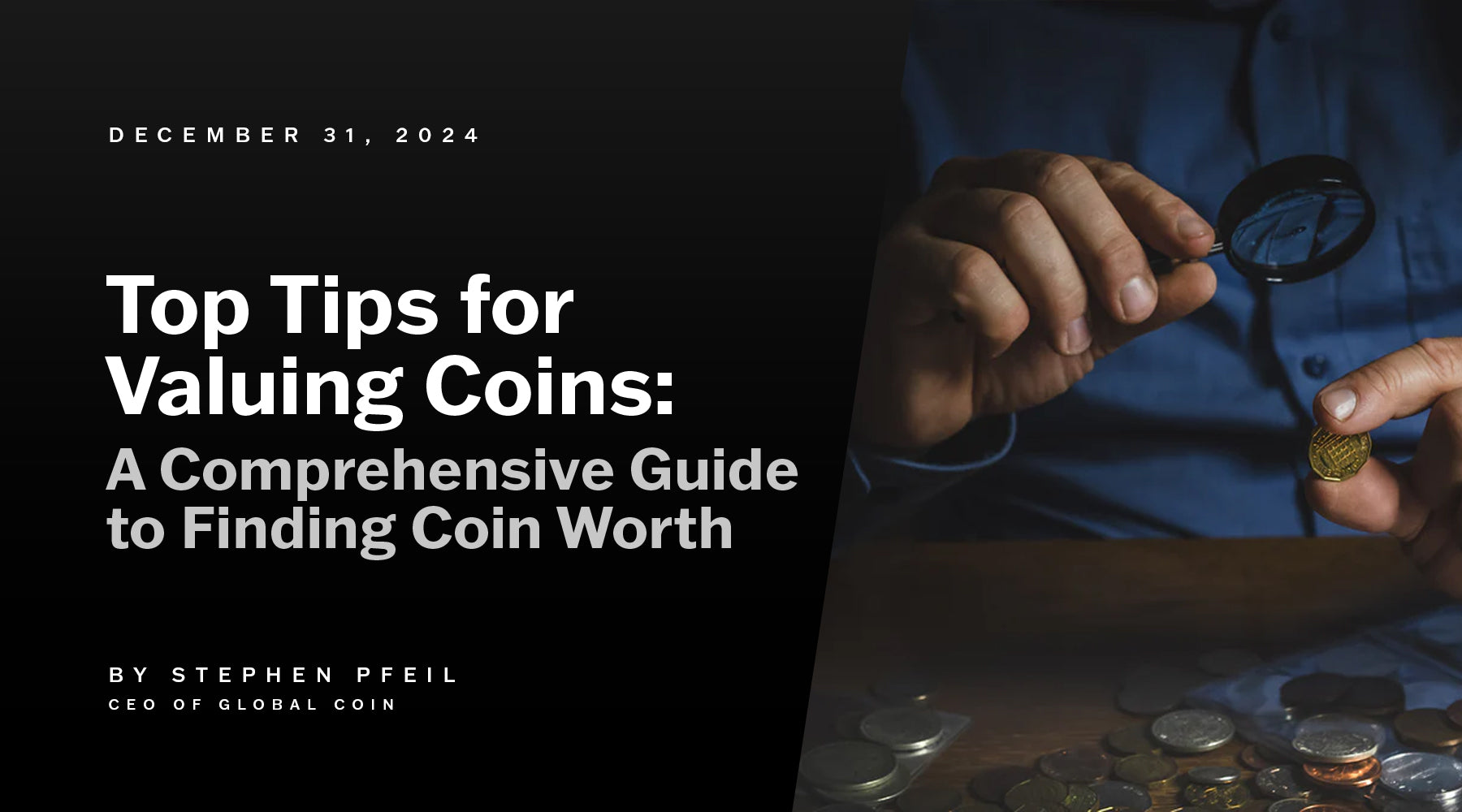
Curious about the value of your coins? This guide on valuing coins covers everything from understanding different types of value, such as market and intrinsic, to identifying key factors that influence coins worth, like rarity and condition. Learn how to evaluate coins accurately, discover your coins' worth, and make informed decisions about your collection.
Introduction to Coin Collecting
Coin collecting, or numismatics, is a captivating hobby that has fascinated people for thousands of years. From ancient civilizations to modern times, individuals have been drawn to the history, artistry, and stories behind coins. Today, coin collecting is more popular than ever, attracting people of all ages who are eager to discover rare coins, silver coins, and unique pieces from around the world. Whether you’re searching for a rare coin with a rich backstory or simply want to learn more about the coins you encounter every day, coin collecting offers endless opportunities for discovery and learning. By exploring the world of coins, you can uncover valuable treasures, connect with history, and build a collection that reflects your interests and passions. No matter your experience level, the journey of coin collecting is both rewarding and educational, offering a chance to own a piece of history and potentially find coins of significant value.
Key Takeaways
-
Coin values can vary based on face value, market value, intrinsic value, and book value, which helps collectors make informed decisions.
-
Key factors influencing coin value include rarity, historical significance, condition, and demand, making each coin a unique collectible.
-
Consulting reputable dealers and using price guides are essential strategies for accurately valuing coins and avoiding common pitfalls in the coin market.
-
Many coin valuation services or initial assessments are available for free, so consider seeking out complimentary options to get started.
Understanding Coin Values

Understanding coin values is essential for successful coin collecting. Coins valued in various ways offer a different perspective on their worth. The face value is the denomination stamped on the coin, indicating its worth as legal tender. For most coins in circulation, this is their typical worth. Most coins you find in your change are only worth their face value, but occasionally, you might discover a rare or valuable coin that is worth more due to its rarity or condition. However, many coins have a market value determined by what someone is willing to pay for them. This market value can often exceed the face value, particularly for collectible coins.
The intrinsic value of a coin includes its actual worth based on factors such as a coin's metal content, rarity, or other unique attributes. For instance, some coins might have an intrinsic value that far exceeds their face value due to their precious metal content. Book value, another significant type, refers to the value listed in coin catalogs and guides, often reflecting the retail price a dealer might sell it for.
Criteria such as demand and rarity can gauge a coin’s collectible potential. A coin’s retail value is what a dealer sells it for, whereas the wholesale value is what dealers might pay to acquire it. Grasping these value aspects aids collectors in making informed decisions about their collections and investments.
Understanding Coin Types
The world of coins is incredibly diverse, with each type offering its own appeal and potential value. Rare coins, such as those with limited mintages or unique errors, are highly sought after by collectors and can command impressive prices. In contrast, common coins—those produced in large quantities—are more readily available and typically less valuable, but they can still be an important part of any collection. Silver coins, including popular dimes and quarters, are especially prized for their precious metal content and historical significance. To accurately determine a coin’s value, collectors should focus on three factors: the coin’s date and mintmark, which reveal when and where it was produced; the mintage, or how many were made; and the coin’s condition, which reflects how well it has been preserved. By understanding these key factors, collectors can make informed decisions about which coins to pursue, how to assess their value, and when to buy, sell, or trade. Whether you’re interested in rare finds or building a set of common coins, knowing what makes each coin unique is essential for successful coin collecting.
Key Factors Influencing Coin Value

Several key factors determine a coin’s value, making each piece a unique artifact of history and economics. Rarity is a major determinant. Coins with specific mintmarks or those produced in limited quantities are often more sought after by collectors. Historical minting practices and the number of surviving coins also play a crucial role in assessing the coin’s rarity.
It’s important to note that two coins from the same year can have vastly different values depending on their mintmark, condition, and mintage.
Historical significance can elevate a coin’s value, particularly if tied to important events or figures. For instance, world coins minted during notable periods or commemorating significant events are highly prized.
The condition of a coin, often graded on a scale, is another crucial factor in determining its market value. Coins in better condition, with minimal wear and original luster, are generally valued higher.
Demand for specific coins can fluctuate based on trends in the collector community and economic conditions. Price guides assist collectors in gauging the market value of their coins based on popularity and demand. Coins made from precious metals, such as silver coins, usually retain higher values due to their material worth. A coin value guide can be a valuable resource for collectors.
Understanding these factors allows collectors to better appraise coins and make strategic decisions in the coin market.
Identifying Your Coins
Proper identification is the initial step in valuing an old coin collection. Recognizing different series of coins, including their dates and mintmarks, is crucial. Mintmarks indicate the particular mint that struck the coin and can significantly affect its value. Knowing a coin’s date, country, and issue is necessary for determining its old coin values. Examining the date and country of origin on an old coin provides a basis for further evaluation. Learning to read a coin's details, such as its date, mintmark, and condition, is essential for proper identification and accurate valuation.
Various tools aid in the identification process. Online searches, apps, and catalogs offer detailed information about specific coins. Coin collections are typically organized by dates within a series, simplifying the tracking and valuation of each piece. Maintaining a comprehensive inventory list of your coins helps in organization and ensures you have all necessary details for valuation.
Grasping these elements is crucial for any coin collector. Whether dealing with common coins like Lincoln pennies or Jefferson nickels, or rarer ones, knowing how to identify a penny and read its details—such as the year, mintmark, and condition—can greatly influence its value. For example, a Lincoln Wheat Penny in excellent condition with a rare mintmark can be worth significantly more than a typical penny. Knowing their specifics enables accurate assessment and informed decision-making about your collection.
Evaluating Coin Condition

The condition of a coin is vital in determining its value. Well-preserved coins with high grades are often considered rarer and more valuable. Luster, or the shiny surface of a coin, significantly impacts its visual appeal and overall value. Coins with minimal wear and retained luster are typically valued higher by collectors.
Grading involves comparing coins to images of various wear stages and using a consistent grading scale for fair assessment. The Mint State Grade indicates no wear, while the Extremely Fine Grade shows small amounts of light wear. A Good Grade coin has major designs in outline, with small details missing. Eye appeal, although subjective, can greatly affect a coin's desirability among collectors.
Proper handling and examination are crucial during evaluation. Handling coins by the edges and over a soft surface prevents damage. Using a magnifying glass under a single light source helps accurately evaluate a coin's condition. These practices ensure coins remain in pristine condition, preserving their value over time.
Using Price Guides and Catalogs
Price guides and catalogs are essential for accurately assessing a coin’s value. The ‘Red Book’ serves as a comprehensive guide for valuing United States coins, with detailed pricing information based on various conditions. For British coins, the Seaby Standard Catalogue offers thorough listings along with market prices. These guides are invaluable resources for coin collectors seeking to understand current market trends. Price guides often provide information about the size of a coin lot or mintage, which can influence a coin's rarity and value—smaller lots typically result in higher desirability and price.
Using price guides involves more than just looking up a coin’s value. It requires understanding the context of the prices listed and how they relate to the coin’s condition and rarity. Cross-referencing prices from multiple sources ensures a more accurate valuation. Online coin value lists and reference books are also helpful for checking a coin’s value and staying updated with market fluctuations.
Demand plays a crucial role in determining prices, and guides often reflect this by listing high-demand coins. Regularly consulting these resources helps collectors stay informed about changing trends and make better decisions about buying, selling, or holding onto their coins.
Researching Coin Values
Researching the value of your coins is a crucial step in building a successful collection. With millions of coins in circulation, it can sometimes be difficult to determine what a particular coin is worth. Fortunately, a variety of resources are available to help collectors make informed decisions. Using a reliable coin value guide, such as those found on Coinappraiser.com, allows you to quickly check the value of your coins based on their date, mintmark, and condition. In addition to printed guides, online resources like auction records and collector forums provide up-to-date information on recent sales and market trends. By verifying the value of your coins through multiple sources, you can ensure you’re getting a fair price when buying or selling, and avoid common pitfalls. Staying informed and doing your research empowers you to confidently determine the value of your collection and make smart choices as a collector.
Coin Market Trends
The coin market is dynamic, with values and prices shifting in response to changes in supply, demand, and collector interest. Understanding coin market trends is essential for anyone looking to maximize the value of their collection. By keeping an eye on coin news, market analysis, and price tracking tools like CoinValueChecker, collectors can stay ahead of the curve and anticipate changes in the market. Factors such as the date of a coin, its rarity, and overall demand can all influence prices, sometimes causing significant fluctuations over time. By regularly reviewing market trends and understanding the factors that drive value, collectors can make informed decisions about when to buy, sell, or hold onto their coins. Staying up-to-date with the latest information ensures that you’re always in the best position to protect and grow the value of your collection.
Consulting Coin Dealers and Appraisers

Consulting professional coin dealers and appraisers is key to accurately valuing and selling a coin collection. Thoroughly researching coin dealers, including their online reviews and professional presence, is crucial before any transactions. Reviews and recommendations are vital in identifying reliable coin shops.
Engaging with professionals who hold numismatic certifications ensures trustworthy transactions. If you cannot find your coin’s value online, consulting a professional appraiser can offer valuable insights and accurate appraisals. Organizations like the American Society of Appraisers and the International Society of Appraisers provide directories of professional appraisers, making it easier to find reputable experts.
Using reputable directories like the Better Business Bureau helps in finding authorized coin dealers. A coin dealer can provide valuable insights and appraisals for your collection, aiding navigation of the coin market with confidence. This step is particularly important for rare or high-value coins, where precise valuation is critical.
Before proceeding, collectors should always inquire about any charge or fee for appraisal or auction services to ensure transparency and avoid unexpected costs.
Coin Collecting Strategies
A thoughtful approach to coin collecting can make the difference between a casual hobby and a truly valuable collection. Developing a coin collecting strategy starts with setting clear goals—whether you’re aiming to complete a specific set, focus on rare coins, or invest in silver coins for their long-term value. Diversification is another key strategy, allowing you to spread your investment across different types, dates, and mints to reduce risk and increase the potential for valuable finds. Paying attention to scarcity and market demand can also help you identify coins with the greatest potential for appreciation. By learning about and applying proven coin collecting strategies, you can make informed decisions, avoid common mistakes, and build a collection that reflects both your interests and your understanding of the market. Whether you’re a new collector or a seasoned enthusiast, having a clear strategy will help you achieve your goals and enjoy the many rewards that coin collecting has to offer.
Avoiding Common Pitfalls
Avoiding common pitfalls is key to maintaining the value of your coin collection. One major pitfall is cleaning or altering coins, as this can significantly diminish their value. Coins should be treated as museum pieces, handled with care to preserve their condition and worth.
Another crucial factor is verifying the reputation of coin dealers before making purchases or sales. Reputable coin dealers can be identified through organizations such as the American Numismatic Association and the Professional Numismatists Guild. Always check the dealer’s reputation to avoid scams and ensure fair transactions.
Security is also essential when storing valuable coins. Consider using secure storage solutions or trusted security companies that specialize in protecting precious metals and other assets to safeguard your investment.
Awareness of these common pitfalls helps collectors better protect their investments and ensure their coins retain value. Treating coins with respect and engaging with reputable professionals are key strategies in successful coin collecting.
Special Considerations for Rare Coins

Rare coins require special considerations due to their unique characteristics and higher values. Rarity is a key driver of a coin’s value, with high demand often leading to increased prices. A shortage of certain coins in circulation or from specific mints can further increase demand and drive up their values. Mintmarks, indicating the specific mint where a coin was produced, can greatly affect its rarity and value.
Design variations and minting anomalies, such as double strikes or off-center minting, significantly enhance a coin’s uniqueness and value. Regional aspects also play a crucial role, as local mints may produce different quantities and designs, impacting a coin’s rarity.
The historical context of a coin can elevate its rarity, especially if it commemorates significant events or periods. Coins with known provenance from notable discoveries, like shipwrecks, often carry enhanced numismatic value, particularly for old coins.
Considering these special aspects assists collectors in accurately appraising and appreciating the value of rare coins.
Selling Your Coin Collection
Selling a coin collection can be rewarding if approached correctly. Coins can be sold at auction, where competitive bidding may drive up prices, or through dealers, where the process may be more straightforward but prices can vary. The place where you choose to sell your coins—such as an auction house, a coin show, or an online platform—can significantly influence the final sale price and the overall selling experience. Private treaty sales and auctions are effective methods, each with its benefits. Auctions can lead to competitive bidding, often resulting in higher prices. Private sales offer negotiation flexibility and potentially better returns if you have interested buyers.
Having a realistic understanding of your coin’s worth is crucial when engaging with dealers. Many collectors often overvalue their coins, so understanding market value is essential. Dealers typically offer around 30% of a coin’s estimated retail value, reflecting their business costs and risks.
Using online platforms to sell coins can also be advantageous, offering a wider reach and better control over the sale process. Researching, planning, and organizing well are essential to selling coins at the highest price. By following these strategies, collectors can maximize returns and successfully navigate the coin market.
Storing and Preserving Coin Collections

Proper storage and preservation of coin collections are essential for maintaining their value over time. Coins should be stored in a controlled environment to prevent damage from humidity and temperature fluctuations. Excess moisture can cause coins to tarnish or corrode, while extreme temperatures can lead to physical damage.
Handling coins correctly is critical to avoid reducing their value. Always handle coins by the edges to minimize contact with the surface, which can leave fingerprints and oils that cause tarnishing. Avoid using plastic holders that contain PVC, as they can damage coins over time. Instead, use archival-quality holders like coin flips, capsules, or sleeves to protect coins from physical abrasion.
Regularly inspecting your coin collection for signs of deterioration or environmental damage is a good practice. This allows you to take preventive measures promptly, ensuring that your coins remain in pristine condition for future generations. Proper storage and handling not only preserve the aesthetic and historical value of your coins but also maintain their market value.
Global Coin: Your Gateway to Exceptional Gold Coins
At Global Coin, we go beyond the surface to carefully curate gold coins that combine historical significance, rarity, and future price potential. Every coin in our collection is selected with a discerning eye, ensuring it meets the highest standards of quality and market appeal. Our long-standing relationships with trusted sources give us access to some of the most sought-after gold coins in the world—pieces that are as valuable for their beauty and history as they are for their financial stability. Whether you’re an investor seeking reliable assets or a collector in search of timeless treasures, Global Coin provides the expertise and exclusive inventory to help you build a portfolio that stands the test of time.
Understanding the various aspects of coin valuing is crucial for any coin collector. By recognizing the different types of coin values, identifying key factors influencing value, accurately identifying and grading coins, and consulting reliable resources, collectors can make informed decisions about their collections. Avoiding common pitfalls and considering special factors for rare coins further enhances the collector’s ability to appraise and preserve their coins.
The journey of coin collecting is not just about amassing currency but appreciating the history, artistry, and stories each coin represents. Armed with the knowledge from this comprehensive guide, you can confidently explore and perhaps even uncover hidden treasures within your collection. For more information about coin auctions, valuation, or our services, we invite you to watch our video. Happy collecting!
Frequently Asked Questions
What is the difference between face value and market value of a coin?
The difference between face value and market value of a coin lies in their definitions; face value is the legal denomination stamped on the coin, while market value reflects what collectors or buyers are willing to pay, which can often exceed the face value due to rarity and demand.
How can I identify the mintmark on my coin, and why is it important?
To identify the mintmark on your coin, look for it on the obverse or reverse; it's crucial as it denotes the mint of production and can greatly influence the coin's rarity and value.
What are some common pitfalls to avoid when collecting coins?
To preserve the value of your coins, refrain from cleaning, altering, or mishandling them. Additionally, ensure that you verify the reputation of any coin dealer to avoid potential scams.
How should I store my coin collection to preserve its value?
To preserve the value of your coin collection, store coins in a controlled environment with stable humidity and temperature, and always handle them by the edges to avoid fingerprints. Utilize archival-quality holders to provide adequate protection against potential damage.
What are the best methods for selling my coin collection?
The most effective methods for selling your coin collection are private treaty sales and auctions, along with utilizing online platforms for broader reach and enhanced control over the sale process.
Related Articles

A Monumental Achievement: The Ultimate 40-Year American Silver Eagle Proof Set
I'm Stephen Pfeil, founder of Global Coin, and today I have the privilege of sharing an extraord...
Discover More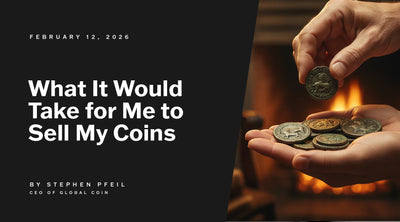
What It Would Take for Me to Sell My Coins
People assume that if the price is right, everything is for sale. I understand why. We live in a ...
Discover More
Modern Numismatic Masterpieces: Why Stephen Pfeil’s New Book Is Redefining 20th and 21st Century ...
Discover More

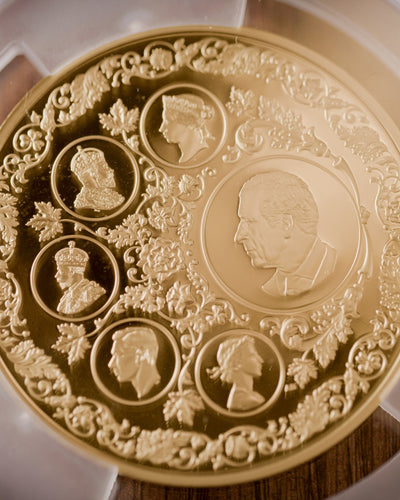
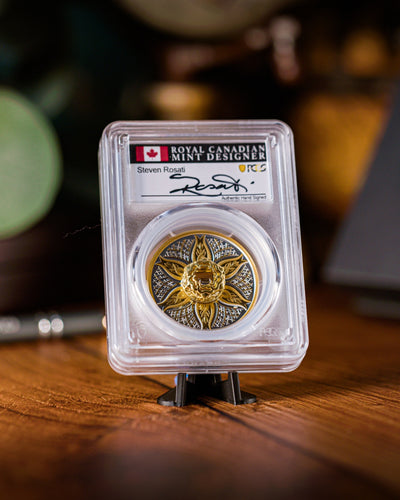
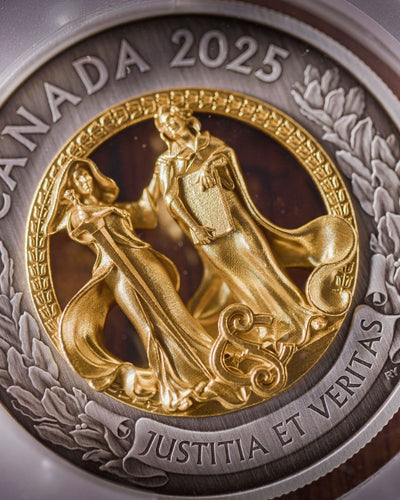
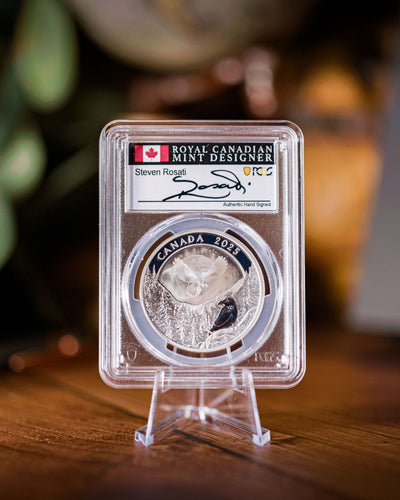
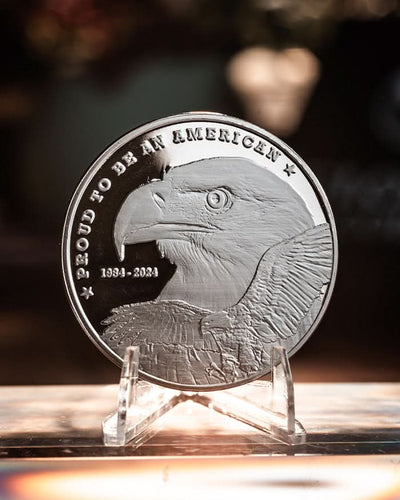
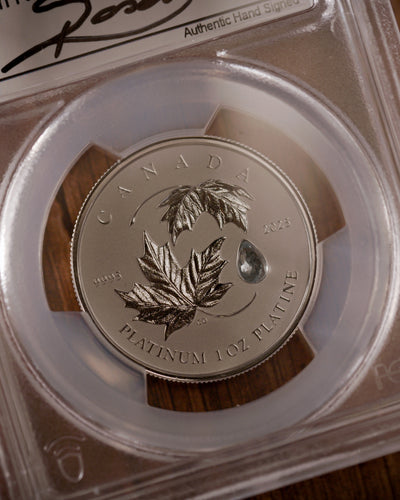
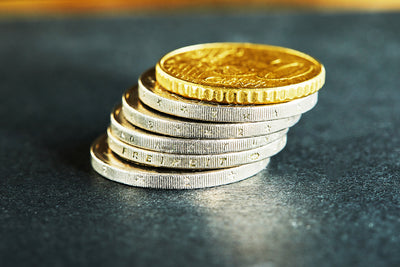
Leave a comment
This site is protected by hCaptcha and the hCaptcha Privacy Policy and Terms of Service apply.